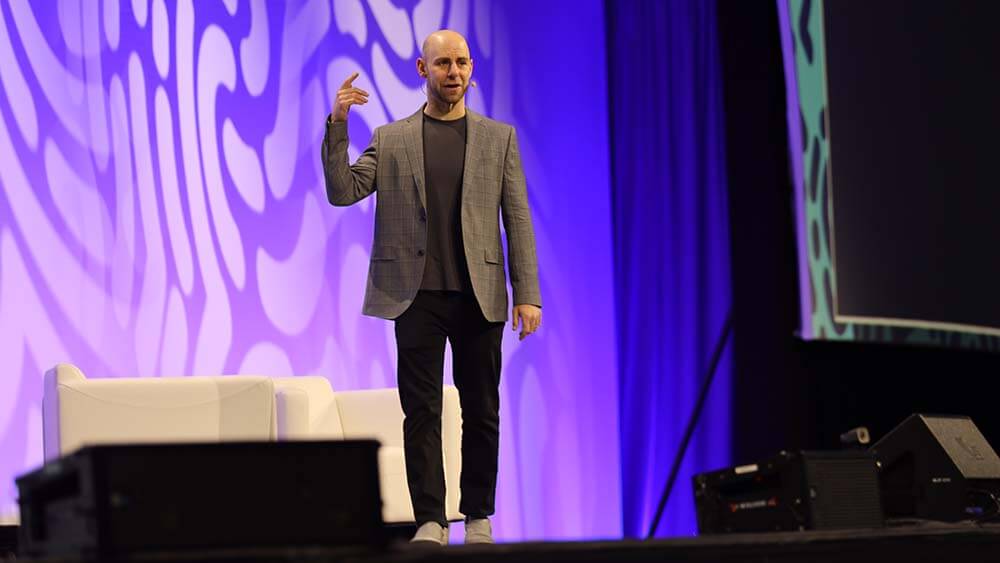
Adam Grant offered Convening Leaders participants ways to bring more original thinking and rethinking to their work. (Whatever Media Company)
In his work as an organizational psychologist and consultant, Adam Grant has seen a lot of companies go out of business, he told a packed audience on Monday afternoon. It wasn’t because their leaders weren’t good at thinking, said Grant, a best-selling author, top-rated Wharton professor, and CL23 Main Stage keynoter. “They were too slow when it came to rethinking,” Grant said. “They fell in love with the way they’d always done things, and they did not question their assumptions until it was too late.”
The faster the world changes, the faster you must update the old assumptions, said Grant, who offered a handful of ways to bring more original thinking and rethinking to your work.
Rethink your network. Almost everyone has support networks made up of mentors, sponsors, and colleagues who cheerlead for you and have your back, Grant said. But rethinking hinges on a different kind of network, which Grant calls a “challenge” network. “Your challenge network is a group of thoughtful critics who you trust to hold up a mirror so you can see your blind spots,” he said.
Grant divides the world into those who are givers and takers, and those who, by temperament, are agreeable and disagreeable. Some of the most valuable feedback you will receive comes from those “disagreeable givers” — blunt people who aren’t afraid to tell you hard truths, but who also have your best interests at heart. “Honesty,” Grant said, “is the highest expression of loyalty.”
Make the unfamiliar familiar. There’s new evidence, Grant said, that leaders under-communicate their visions to their teams nine times less often than what’s needed to get their point across. That’s because, “once you get your vision, you assume everybody else does, too,” he said. But not only do leaders need to repeat their messages more often, they can also do so more effectively by making connections with ideas that other people are already familiar with, he said. “You can give other people these kinds of ‘familiarity bridges,’ so they don’t reject your new ideas,” Grant said. “This is why broad experience is so important. It’s why it’s as valuable as deep experience, because the more time you spend with people in other cities, other countries, other industries, other jobs, the more of these bridges you can build.”
Establish psychological safety. Psychological safety is the confidence “that you can take a risk without being punished or that you could speak up and challenge the status quo without fear,” Grant said. “We have extensive evidence that when you build that kind of psychological safety, people are more willing to think again, and also more courageous in telling [leaders] what to rethink.” We know, Grant added, “when people have psychological safety, they let their ideas fly. When they lack it, they bite their tongues.”
It’s common for bosses to say, “Don’t bring me problems, bring me solutions,” Grant said. “I get why leaders say this: You want people to take initiative and be constructive, not to whine and complain. But if people can only speak up when they have a solution, you will never hear the biggest problems, which are too complex for any one person to solve. The foundation of building psychological safety is encouraging people to raise problems even if they don’t know how to fix them yet. And that empowers the canaries in the coal mine who are good at detecting threats to raise them even if they don’t have the expertise or the authority to do something about it.
“My biggest fear,” Grant said, “is that as we move into this endemic phase of COVID, that we are going to stop rethinking when we’re not forced to question our assumptions anymore. And I don’t want it to end. I want to see all of you engage your challenge network. I want you to give [your teams] the psychological safety to tell you what you could do better or even preempt them and tell them what you think you could do better — and see if they have notes. And if you do that, you’re a lot more likely to keep growing and keep evolving, not only as an industry but also as individuals.”
Barbara Palmer is deputy editor of Convene.
